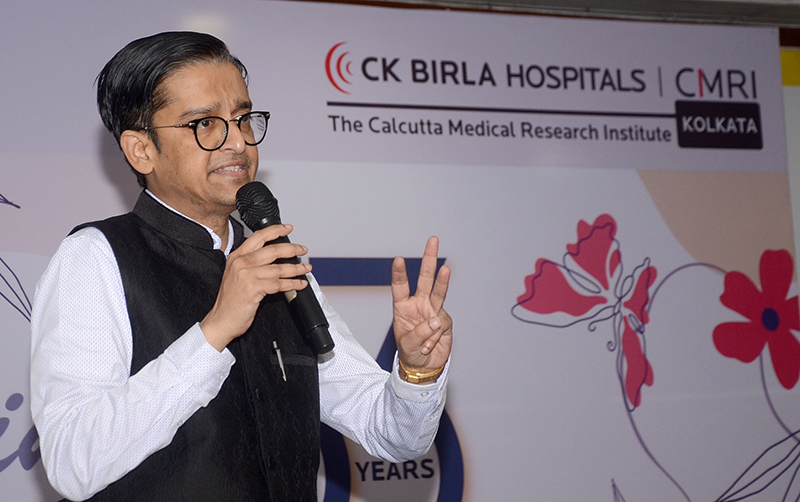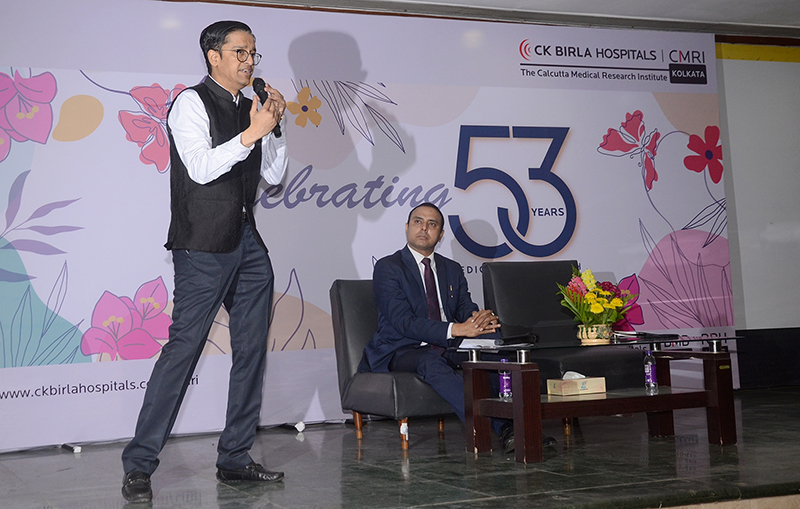International study, featuring Kolkata's CMRI, finds Doxycycline effective in checking progression of Covid-19
Kolkata: A study conducted by a group of doctors from several nations, including India, has found that in hospitalized COVID-19 patients, antibiotic drug Doxycycline was a safe and inexpensive treatment widely available throughout the globe and it reduced ICU admissions when added to standard of care.
The Indian part of the trial was conducted across six hospitals which included Kolkata’s CK Birla Hospitals –CMRI.
Doxycycline is an inexpensive antibiotic that has been used for many years for several indications and has an excellent safety profile.
The antibiotic has anti-inflammatory properties which helps in tissue protection and antioxidative action.
A trial was conducted to test the hypothesis that Doxycycline works to stop the progression of Covid-19 infections to prevents ICU admissions in hospitalised patients.

This study was conducted from the end of 2020 and continued till June 2021.
Most of the patients were recruited between April 2021- June 2021 when there was the greatest deluge of severe cases.
Raja Dhar, heading the Pulmonology department at the CMRI Hospitals in Kolkata, was the Principle Investigator and oversaw the entire study process.
Speaking on the trial, Dhar told IBNS: “This has been an excellent pragmatic and very friendly collaboration by experts across multiple continents and we are greatly encouraged by the findings for this well-known and widely available antibiotic."
He said the study was very much important for India.
“The trial showed us that use of Doxycycline in moderate COVID-19 hospitalised patients actually saved lives. It also reduced transfer to ICUs,” he said.
“It was important for the individuals as well from the health economy perspective where we were struggling to cope with requirements for beds, hospitals and even the mortuaries were full,” he said.
He said: “We feel that today the importance of the trial is that what happened for COVID-19 could be replicated in other respiratory viral infections as well.”
He said: “We feel that some viral infections are still prevalent in the country as well as in other corners of the globe. So, we feel that giving Doxycycline to similar patients who are admitted to hospital with moderate disease will prevent progression of disease to a severe form. This is something we will look into in the future studies as well.”
The other participating centres were Ruby Hall Clinic in Pune, Yashoda Super Specialty Hospital in Ghaziabad, UP, Saroj Super specialty Hospital and Jaipur Golden Hospital in Delhi, Kalyan Hospital and Sterling Hospital in Vadodara, and Yashoda Hospital in Hyderabad.
The app for this study was designed by Dr Stephan D. Gadola, Clinical Immunologist and Research Scientist from Basel, John Kirkpatrick, Senior Principal Statistical Scientist, Cambridge.

Ratko Djukanovic, current Head of the Respiratory and Critical Care, Southampton NIHR Biomedical Research Centre, along with Professor Stephn Gadola and Raja Dhar conceptualized the study, supervised it, and ultimately wrote up the study.
John Krikpatrick, a highly skilled statistical scientist, did all the statistics for the study.
Additionally, Senior Scientist Laura Gilbert from the UK, Marcel Stern and Oliver T. Keppler, Germany gave scientific inputs for this study. Hence, the study had experts from throughout the globe.
There were 387 participants who participated in the study. 77 developed critical diseases needing ICU admission.
“The arm in which doxycycline was given had an absolute and relative risk reduction compared to the arm which did not have doxycycline,” Dhar said.
“The reduction was significant by statistical analysis. Doxycycline was also well tolerated and not a single patient required stoppage of treatment due to adverse events,” he said.
The conclusion of the trial was that in hospitalized COVID-19 patients, doxycycline was a safe and inexpensive treatment widely available throughout the globe and it reduced ICU admissions when added to standard of care.
(Reporting by Supriyo Hazra/Images by Avishek Mitra/IBNS)
IBNS
Senior Staff Reporter at Northeast Herald, covering news from Tripura and Northeast India.
Related Articles

Delhi chokes as AQI slips to ‘severe’, smog blankets city
Delhi was shrouded in a thick haze on Sunday morning as air quality across the national capital slipped further into the ‘severe’ category.

Too much social media? Scientists find link to attention loss in kids
Children who spend significant time on social media may experience a gradual decline in their ability to concentrate, according to a comprehensive new study by Sweden’s Karolinska Institutet.

Traditional medicine takes center stage! WHO reveals a worldwide wellness boom!
The vast majority of World Health Organization (WHO) member States say 40 to 90 per cent of their populations now use traditional medicine.

Ozempic lands in India at just Rs 2,200 — The weight-loss shot arrives!
Drugmaker Novo Nordisk on Friday launched its blockbuster diabetes drug Ozempic in India, at a time when treatment demand for diabetes and weight loss is accelerating across the country.
Latest News

India on the verge of a rail milestone: 99% of broad-gauge network now electrified

Seven years, then goodbye: Amy Schumer, Chris Fischer end their marriage

GOATs unite at Wankhede: Lionel Messi meets Sachin Tendulkar in iconic moment

You are the GOAT: Sara Arjun’s emotional note for Dhurandhar director Aditya Dhar goes viral

